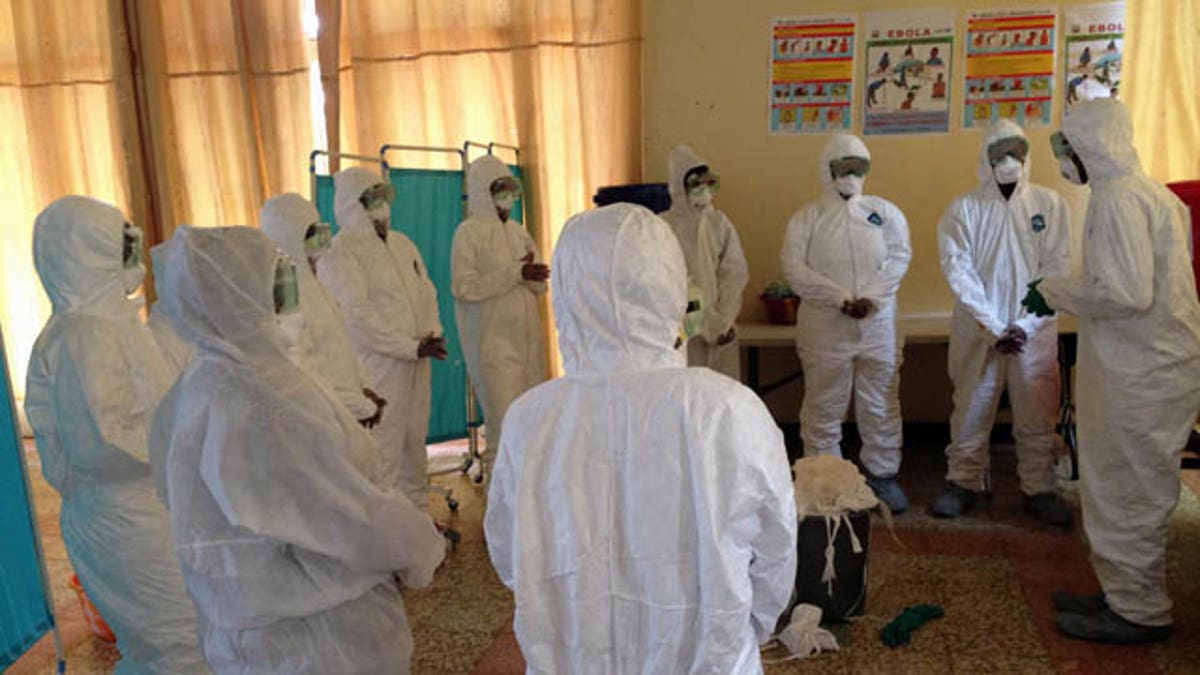
This photo provided by Dr. Dan Lucey, of the Georgetown University Medical Center, shows a session he supervised in Sierra Leone to train local health workers how to properly put on and take off equipment to protect against the Ebola virus. (AP Photo/Dan Lucey)
FREETOWN, Sierra Leone – The World Health Organization said Saturday it could not meet a request from Sierra Leone to evacuate a doctor who contracted the deadly Ebola disease.
Dr. Olivet Buck is the fourth doctor from Sierra Leone to come down with Ebola, which has been blamed for 2,400 deaths in West Africa, according to the WHO. Liberia, Sierra Leone and Guinea have recorded the vast majority of cases.
Sierra Leone requested funds from the World Health Organization to evacuate the doctor to Germany on Friday. A letter from President Ernest Bai Koroma's office said he had approved Buck's evacuation to a hospital in Hamburg, Germany, "where they are in readiness to receive her."
Buck, a citizen of Sierra Leone, would be the first doctor from one of the countries hit hardest by Ebola to receive treatment abroad. The other three doctors from Sierra Leone died in the country.
The letter, sent to the WHO's country representative on Friday and seen Saturday by The Associated Press, said Buck tested positive for Ebola on Tuesday. "We have been informed that Dr. Buck is quite ill," it said.
A spokesman for the WHO said on Saturday, however, that it could not comply with the request and instead would work to give Buck "the best care possible" in Sierra Leone, including access to experimental drugs.
"WHO is unable to organize evacuation of this doctor to (Germany) but is exploring all options on how to ensure best care," WHO spokesman Tarik Jasarevic said.
"WHO will facilitate the best care possible in country for Dr. Buck, including access to experimental drugs," Jasarevic said.
There is no licensed treatment for Ebola, though a small number of patients have received unproven treatments, with mixed results. It is not clear how these treatments influenced whether the patients recovered or not.
Because Ebola is only transmitted through contact with the bodily fluids of people showing symptoms or from dead bodies of Ebola victims, health workers have been especially vulnerable as they respond to the worst outbreak in history.
A total of 301 health workers had become infected with the disease as of Sept. 7 in Guinea, Liberia and Sierra Leone, according to the WHO. Of that tally, which included suspected and probable cases in addition to confirmed ones, 144 had died.
The infections have exacerbated shortages of doctors and nurses in West African countries that were already low on skilled health personnel.
So far, only foreign health and aid workers have been evacuated abroad from Sierra Leone and Liberia for treatment.
Dr. Sheik Humarr Khan, Sierra Leone's top Ebola doctor, was being considered for evacuation to a European country when he died of the disease in late July.
Cuba's health ministry announced Friday it will send more than 160 health workers to fight Ebola in Sierra Leone, a move that WHO Director-General Dr. Margaret Chan said would "make a significant difference."
In Liberia, the country that has recorded the highest number of Ebola cases and deaths, officials on Saturday released a letter that President Ellen Johnson Sirleaf sent this week to U.S. President Barack Obama appealing for a dramatic increase in support to address an emergency she said "threatens civil order."
Sirleaf described how her country's health system had been swiftly overwhelmed by the outbreak, and how doctors were afraid to go to work after seeing their colleagues die. "Diseases that were treated with relative ease pre-Ebola now take lives because of the pall that Ebola has cast over our health system," she said.
In the letter dated Tuesday, Sirleaf asked for the U.S. to set up and operate at least one Ebola treatment unit in the capital, Monrovia, and to help restore services at 10 non-Ebola hospitals. She also requested help in maintaining "air bridges" to get supplies and personnel into the country, noting that many airlines have canceled flights in and out of Monrovia.
"I am being honest with you when I say that at this rate, we will never break the transmission chain and the virus will overwhelm us," Sirleaf said.
